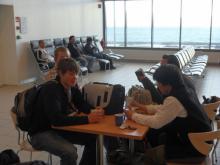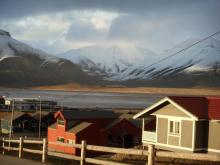What Are They Doing?
The team traveled to Svalbard, Norway, located in the High Arctic, to investigate how high latitude glaciers, melt-water streams, and sedimentation in lakes and fjords respond to climate change. The Svalbard region has been marked by the retreat of glaciers, reductions in sea ice, and measurable warming throughout the Holocene period, and more specifically during the last 90 years. The Svalbard archipelago has preserved geologic records of climate change since the last ice age, which makes it an ideal location for this study.
In addition to two lead researchers, the research team was made up of approximately 10 undergraduate students participating in the Research Experiences for Undergraduates (REU) program. Students’ defined their research questions and testable hypotheses throughout the program. The students’ research was aimed at understanding how climate influences glacial, stream, and lake systems in order to better interpret the sediment record of climate change.
Where Are They?
The team workied on and around the glaciers and lakes of Kapp Linne near their field camp at Isfjord Radio on western Spitsbergen, the largest island in the Svalbard island archipelago. The Svalbard archipelago is situated in the Arctic Ocean, north of mainland Europe, approximately mid-way between Norway and the North Pole. Svalbard is the northernmost part of Norway.
Latest Journals

Dr. Steve Roof is an Associate Professor of Earth and Environmental Science at Hampshire College. Professor Roof's teaching and research focus on environmental issues such as climate change, pollution, and land conservation. He consciously integrates the scientific, political, and social aspects of environmental problems in his classes and projects. He teaches and supervises projects in geology, climate change, resource conservation, land use planning, geographic information systems, environmental chemistry, and the evolution of scientific thought. He and his students travel frequently to Death Valley and the Southwest for climate change field research. He also coordinates the Svalbard REU program, taking undergraduate students to the High Arctic. To learn more about Dr. Roof, please visit his faculty biography page [http://www.hampshire.edu/faculty/sroof.htm]

Dr. Al Werner is a Professor of Geology at Mt. Holyoke College. His areas of research are in geology and climate change. As a kid he was told "not to play in the mud," but now he makes a living doing just that! Werner's fieldwork has taken him across the circumpolar world. He and his students conduct their research in remote locations—from Alaska to the Canadian Arctic to Spitsbergen, an island in the Norwegian-Greenland Sea—bringing recovered sediment cores from lakes back to the laboratory to learn more about past environmental change. To learn more about Dr. Werner, please visit his faculty biography page [http://www.mtholyoke.edu/acad/facultyprofiles/alan_werner.html]





